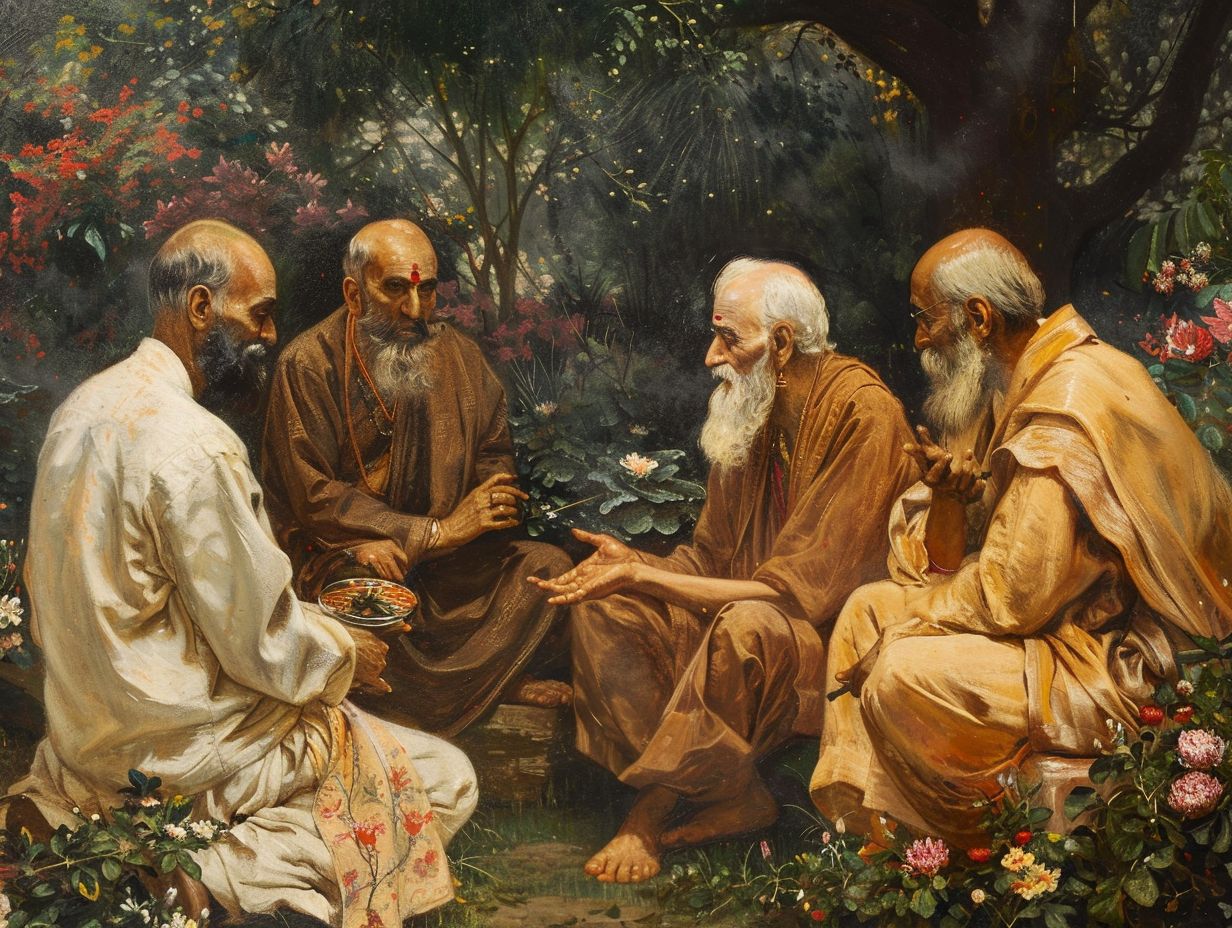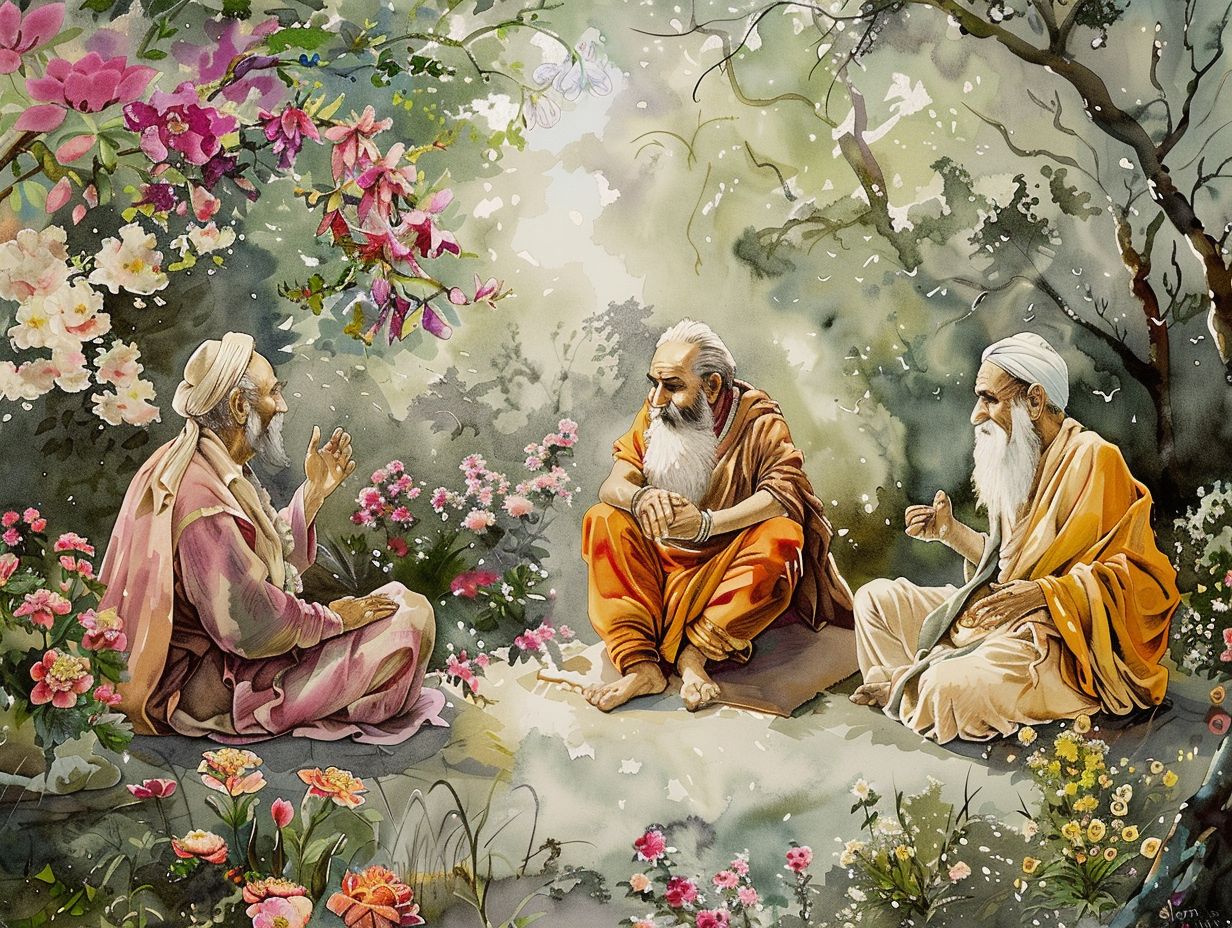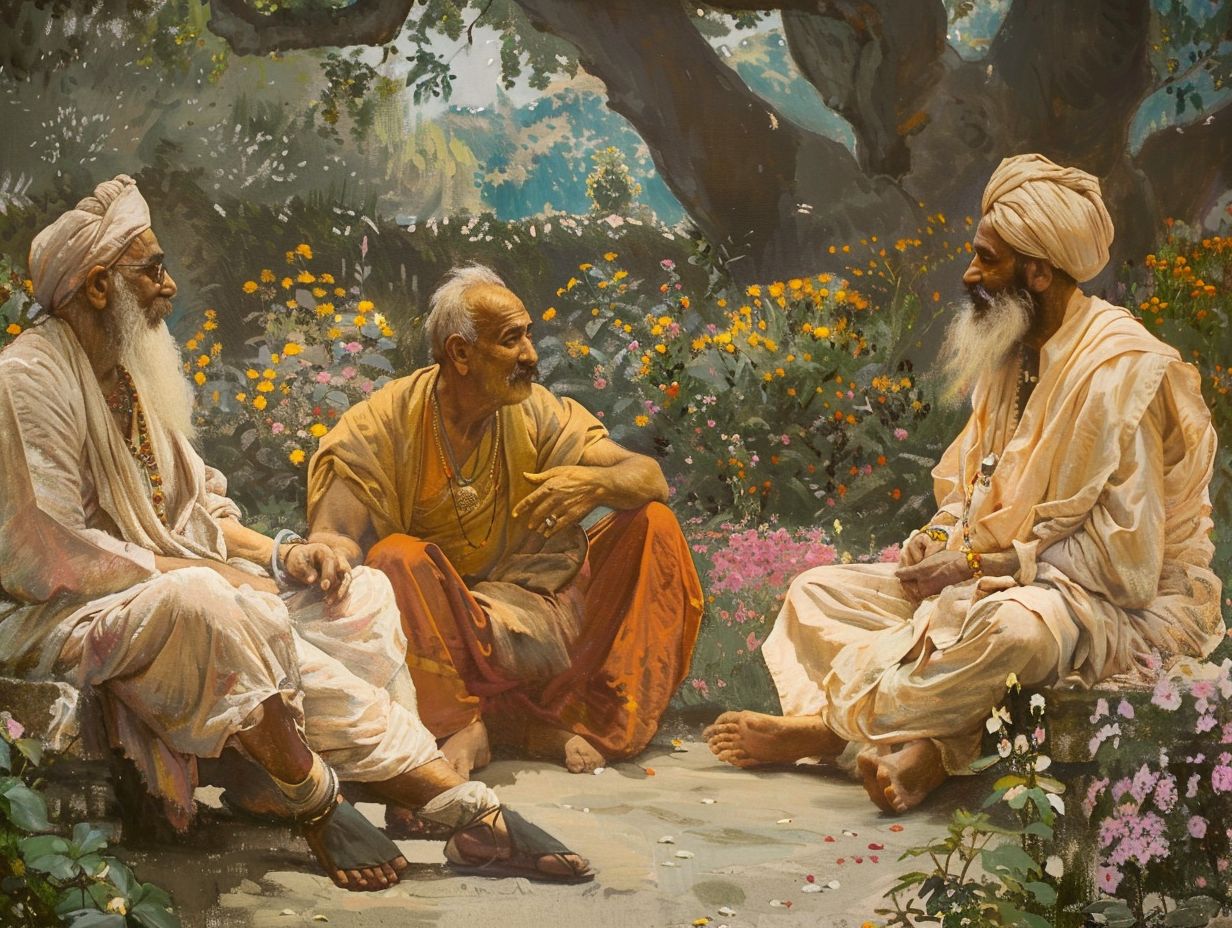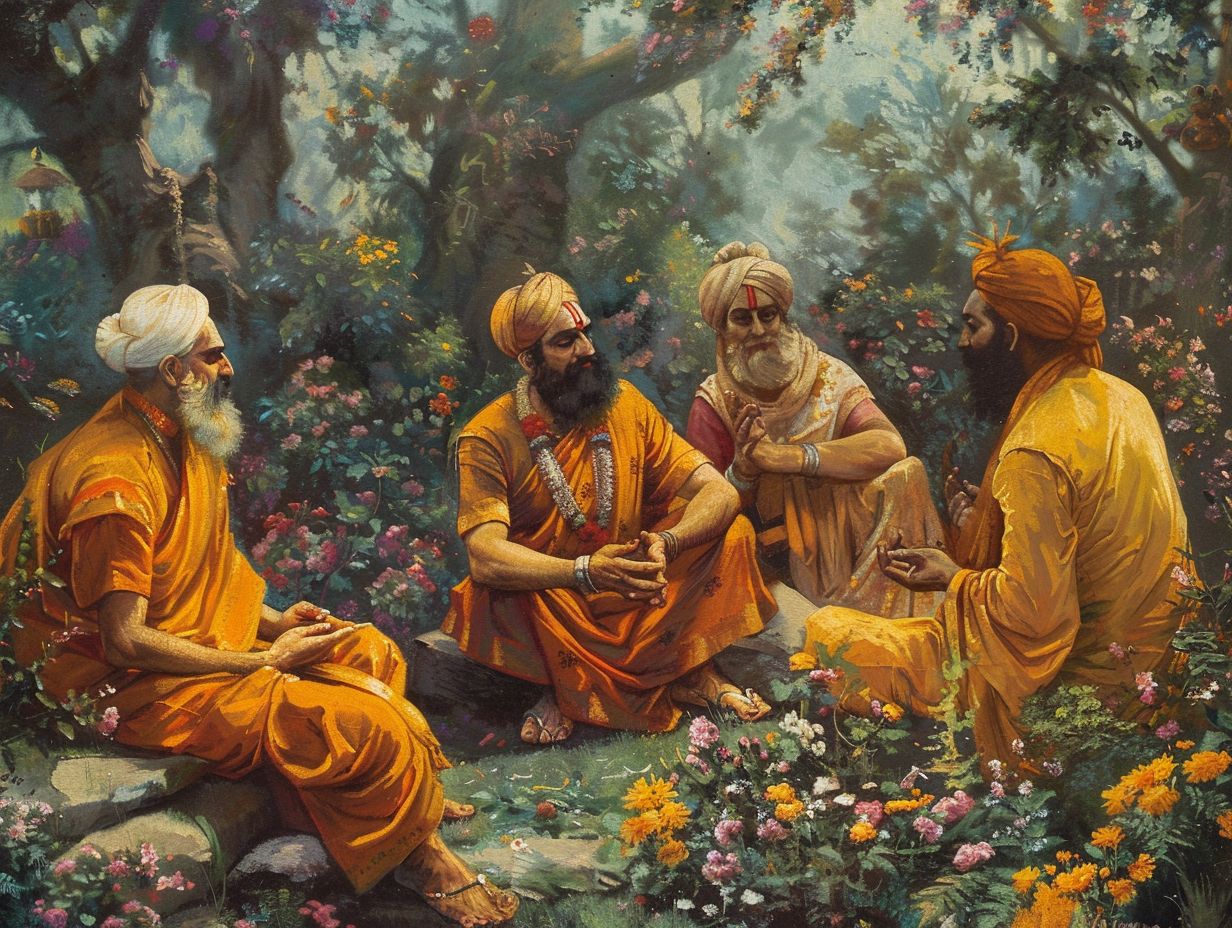Notable Philosophers: Vatsyayana, Udyotkara, Jayanta Bhatta, Udayanacharya
Philosophy has been profoundly shaped by the contributions of remarkable thinkers who have dared to challenge perceptions and expand the understanding of the world. Among these influential figures are Vatsyayana, Udyotkara, Jayanta Bhatta, and Udayanacharya each of whom has left an indelible mark on philosophical discourse.
This exploration delves into their lives, highlighting key contributions and the enduring impact of their ideas on both Indian and Western philosophy. It unveils how their insights maintain relevance in contemporary society and continue to inspire modern thought.
Who Are Notable Philosophers?

Notable philosophers have profoundly influenced the landscape of philosophical discourse through their significant contributions to various schools of thought, including Indian philosophy and classical philosophy. Figures such as Vatsyayana, Udyotkara, Jayanta Bhatta, and Udayanacharya have engaged in a vibrant exchange of ideas, tackling complex themes such as epistemology, ethics, poetics, and metaphysics.
Their works have established a foundational framework for critical discussions concerning reality, perception, knowledge, truth, and morality, leaving an indelible mark on both Eastern and Western thought throughout history.
Vatsyayana
Vatsyayana, a distinguished luminary in Indian philosophy, is renowned for his groundbreaking work, the Kama Sutra. This text transcends the confines of mere eroticism to delve into the profound dimensions of love, beauty, and ethical living, intricately woven into the rich tapestry of ancient Indian philosophical traditions.
Who Was Vatsyayana?
Vatsyayana, an esteemed ancient Indian philosopher believed to have flourished around the 3rd century CE, stands out for his profound scholarly contributions that extend beyond erotic literature to encompass ethics and the philosophy of mind.
He is best known for authoring the ‘Kama Sutra’, a seminal text that intricately explores the multifaceted dimensions of love, relationships, and intimate connections, offering insights into the human experience that continue to resonate in contemporary society.
Vatsyayana s work deftly navigates the delicate balance between desire and ethical conduct, mirroring the complexities of human emotions. His writings have not only shaped the discourse surrounding kama, or sensual pleasure, but have also influenced subsequent philosophical thought in India, skillfully bridging aesthetics, morality, and social conduct.
As a pivotal figure in ancient philosophy, he played an essential role in the evolution of ideals concerning personal relationships and spirituality, leaving a lasting legacy that endures through the ages.
What Are Vatsyayana’s Contributions to Philosophy?
Vatsyayana’s contributions to philosophy are primarily encapsulated in the Kama Sutra, a text that intricately intertwines ethical principles, social norms, and the art of living, offering a profound understanding of the human experience.
This ancient work transcends the realm of mere eroticism, inviting readers to delve into the complexities of relationships and personal fulfillment through the lens of ethical considerations. By articulating key concepts surrounding passion, duty, and morality, it serves as a vital bridge between pleasure and righteous living. The Kama Sutra encourages individuals to reflect upon their desires while remaining cognizant of their societal responsibilities, thereby addressing broader moral questions that resonate deeply within Indian philosophy.
This holistic perspective not only influences views on intimacy and attraction but also emphasizes the essential balance required in pursuing a life that honors both personal aspirations and communal values.
Udyotkara
Udyotkara, a distinguished philosopher within the Nyaya school of thought, made substantial contributions to the realms of logical reasoning and epistemology. His work centers around the meticulous analysis of knowledge, perception, and inference, embodying the essence of ancient Indian philosophical inquiry.
Who Was Udyotkara?
Udyotkara, an esteemed philosopher of the Nyaya school, is renowned for his rigorous analysis of epistemology and his commitment to elevating the philosophical discourse surrounding knowledge and logical reasoning.
His contributions profoundly influenced the understanding of pramana, or means of knowledge, broadening the conventional concepts of perception and inference. Through his meticulous arguments and innovative interpretations, Udyotkara engaged thoughtfully with the works of both his predecessors and contemporaries. His writings did not merely build upon established doctrines; they also challenged prevailing paradigms, emphasizing the necessity for clarity and precision in the quest for truth.
This dedication to analytical rigor solidified his position as a pivotal figure in the evolution of Indian philosophy, as he endeavored to establish a systematic approach to knowledge that would leave an enduring mark on generations of scholars within the Nyaya tradition and beyond.
What Are Udyotkara’s Contributions to Philosophy?

Udyotkara’s contributions to philosophy find their foundation in his seminal works on Nyaya, where he skillfully formulates logical arguments and critiques. His efforts significantly enhance the understanding of epistemic justification and the philosophy of language.
Through his insightful examination of the principles of perception and inference, Udyotkara unveils the intricate relationships between cognition and linguistic expressions, inviting deeper inquiries into the ways in which language shapes one’s comprehension of reality.
By meticulously analyzing the criteria for valid reasoning, he offers valuable frameworks that continue to influence contemporary debates in logic and argumentation. His exploration of the role of inference in determining truth underscores the importance of context and intent within communicative acts, revealing far-reaching implications for the philosophy of language.
Such rich discussions not only elevate the appreciation for traditional Indian philosophical thought but also challenge prevailing paradigms within modern epistemology.
Jayanta Bhatta
Jayanta Bhatta, a distinguished figure within the Indian philosophical tradition, is esteemed for his incisive critiques of Buddhist philosophy and his vigorous defense of the Nyaya school against its adversaries.
His contributions significantly enhance the discourse surrounding metaphysical inquiry and philosophical ethics, illuminating complex debates with clarity and depth.
Who Was Jayanta Bhatta?
Jayanta Bhatta stands as a significant figure in Indian philosophy, renowned for his incisive critiques of various philosophical schools, particularly Buddhism. He engaged vigorously with these ideas in his writings on philosophical ethics and epistemology.
His reflections offered profound insights into the nature of knowledge, underscoring the importance of perception and inference in comprehending reality. Bhatta’s works, particularly the ‘Nyaya Sutras’ and ‘Vada Vidya’, exemplify his rigorous approach to philosophical inquiry. He played a pivotal role in defending the orthodox positions of the Nyaya school against the challenges presented by Buddhist thought, advocating for a rational framework that emphasized logical argumentation.
Through his eloquent critiques and analyses, Bhatta not only enriched the discourse surrounding ethical principles but also contributed significantly to the evolution of a nuanced understanding of epistemological theories within the broader landscape of Indian philosophy.
What Are Jayanta Bhatta’s Contributions to Philosophy?
Jayanta Bhatta’s contributions to philosophy are distinguished by his incisive writings that challenge established Buddhist doctrines, particularly in the realms of epistemology and ethics, where he ardently asserts the validity of the Nyaya perspective.
In his works, he meticulously critiques the foundational elements of Buddhist thought, positing that perception and inference are critical tools for the acquisition of knowledge. By juxtaposing Nyaya s robust epistemological framework with Buddhist skepticism, he highlights the potential pitfalls associated with an exclusive reliance on experiential validation.
His examination of ethics is equally significant; he advocates for the necessity of objective moral standards, countering the relativistic tendencies that permeate certain Buddhist interpretations. This pivotal discourse not only fortifies the Nyaya tradition but also opens avenues for further dialogue regarding the implications of these philosophical positions in contemporary ethical discussions.
Udayanacharya
Udayanacharya, a distinguished philosopher within the Nyaya-Vaisheshika tradition, is renowned for his profound commentaries on ancient philosophical texts. His contributions have played a pivotal role in the interpretation and evolution of Indian philosophical systems, marking him as a significant figure in the realm of philosophical discourse.
Who Was Udayanacharya?
Udayanacharya, a prominent philosopher within the Nyaya-Vaisheshika tradition, is esteemed for his extensive scholarly contributions to Indian philosophy, particularly through his astute commentaries on foundational texts.
His works not only illuminate the intricate arguments of earlier thinkers but also offer a systematic framework for comprehending the nature of reality, perception, and knowledge. Udayanacharya was instrumental in the development of logic and epistemology within Indian intellectual tradition, engaging profoundly with the writings of esteemed predecessors such as Gautama and Vatsyayana.
Through his commentaries on texts like the Nyaya Sutras, he aimed to clarify and elaborate on the principles of inference and debate, ensuring that the complexities of philosophical discourse remained accessible to future generations. His intellectual legacy continues to inspire scholars and enthusiasts in their pursuit of understanding Indian philosophy.
What Are Udayanacharya’s Contributions to Philosophy?

Udayanacharya’s contributions to philosophy are particularly prominent in his exhaustive commentaries, which elucidate and expand upon vital philosophical themes, especially in the realms of epistemology and metaphysics within the framework of Indian philosophy.
His astute analyses probe the complexities of knowledge, examining how perception and inference inform human understanding. By tackling fundamental issues such as the nature of reality and the legitimacy of sources of knowledge, he establishes a foundation for continued discourse in both philosophical ethics and metaphysical exploration.
The clarity and profundity of his writings have not only left a significant impact on his contemporaries but have also reverberated through the ages, offering essential tools for scholars and thinkers alike. Through his work, Udayanacharya has nurtured a rich tradition of critical inquiry, inspiring seekers of truth to engage with intricate philosophical questions that remain remarkably relevant today.
How Have These Philosophers Influenced Modern Thought?
The impact of philosophers such as Vatsyayana, Udyotkara, Jayanta Bhatta, and Udayanacharya transcends their specific historical contexts, profoundly influencing both Indian philosophy and the wider Western philosophical landscape.
Their complex arguments and analyses have left an indelible mark, fostering a rich dialogue that continues to resonate across time and cultures.
1. Impact on Indian Philosophy
The impact of Vatsyayana, Udyotkara, Jayanta Bhatta, and Udayanacharya on Indian philosophy is undeniably profound, as their contributions continue to inform and enrich the philosophical traditions that have evolved over centuries.
These thinkers have made significant strides in various domains, including epistemology, ethics, and metaphysics, shaping the discourse surrounding knowledge and reality within the Indian context. By introducing compelling arguments that interrogate the nature of perception, inference, and belief, they have established a foundational framework for a nuanced understanding of truth and morality.
Their explorations into the ethical implications of human actions invite a reconsideration of how individuals navigate moral dilemmas, placing a spotlight on the importance of context and intent. In doing so, they foster an ongoing dialogue among contemporary scholars, ensuring that their insights remain pertinent in modern philosophical inquiries.
2. Influence on Western Philosophy
The ideas articulated by these Indian philosophers resonate profoundly within Western philosophy, shaping the evolution of comparative philosophy and inspiring scholarly discourse that unites Eastern and Western thought.
This cross-cultural dialogue manifests in the shared exploration of concepts such as ethics, consciousness, and the nature of reality, where the epistemological inquiries of Indian traditions serve as a compelling counterpoint to Western rationalism.
Central themes, including the transient nature of existence and the pursuit of enlightenment, reveal how diverse philosophical traditions confront similar existential questions while employing distinct methodologies.
The interplay between these varied perspectives not only enriches the academic landscape but also cultivates a deeper understanding of global philosophical heritage, fostering a fertile ground for collaborative enlightenment and mutual respect.
3. Relevance in Today’s Society
The teachings and philosophical systems of Vatsyayana, Udyotkara, Jayanta Bhatta, and Udayanacharya retain their relevance in contemporary society, offering profound insights into ethical dilemmas and the intricacies of human experience.
Their perspectives encourage reflection on the nature of morality, relationships, and personal fulfillment, guiding individuals as they navigate modern challenges, including digital ethics, consent in interpersonal dynamics, and the pursuit of happiness amid societal pressures.
For example, Vatsyayana s explorations of love and desire illuminate the ongoing discussions surrounding intimacy and partnerships in our technologically advanced age, while Udayanacharya s logical frameworks enhance the understanding of justice and responsibility in public discourse.
These philosophers inspire contemporary thinkers to reevaluate not only personal choices but also the broader ethical landscape, demonstrating how ancient wisdom continues to inform and enrich engagement with pressing philosophical inquiries.
Frequently Asked Questions
Who is Vatsyayana and what is he known for?

Vatsyayana was a notable philosopher and scholar from ancient India. He is most well-known for authoring the Kama Sutra, a text on human sexuality and relationships.
What are Udyotkara’s contributions to philosophy?
Udyotkara was a prominent philosopher and commentator on the works of Hindu philosopher, Shankara. He is known for his commentary on the Brahma Sutras, which is considered one of the most authoritative works on Vedanta philosophy.
Who was Jayanta Bhatta and what did he believe?
Jayanta Bhatta was a 9th century Indian philosopher and logician. He was a proponent of the Nyaya school of thought and is known for his contributions to the fields of logic, epistemology, and metaphysics.
What is Udayanacharya’s significance in Indian philosophy?
Udayanacharya, also known as Udayana, was a 10th century Indian philosopher and logician. He is considered one of the most influential figures in Navya-Nyaya, a school of thought that focuses on logical reasoning and analysis.
Did Vatsyayana only write the Kama Sutra?
No, Vatsyayana also wrote other works on various subjects such as Dharma, politics, and economics. However, the Kama Sutra remains his most widely known and discussed work.
How do the philosophies of Udyotkara, Jayanta Bhatta, and Udayanacharya differ?
While all three were proponents of the Nyaya school of thought, they had differing views on certain philosophical concepts and approaches. Udyotkara focused on reconciling the Nyaya school with the teachings of Shankara, while Jayanta Bhatta and Udayanacharya had differing opinions on epistemology and logic within the school.
